A master thief creeps over cobbles in an early modern metropolis that splits the difference between Edinburgh, Glasgow and Liverpool. Lit by gaslamps that can’t quite dispel the industrial haze, they pass for a civilian – a rough one, admittedly, but not shady enough to cause an itch in the swordarm of any passing guard.
Until, that is, they take to the thieves’ highway – following the trajectory of their grappling hook upward to the rooftops, from which they can see the shape of the city, and the moon beyond. Up here, it’s a parallel world – the trees on street level answered by chimney stacks, and the distant hills echoed by the rise and fall of steep gables. “We’re super proud of these rooftops,” says Greg LoPiccolo. “It’s an amazing landscape that we put a lot of thought and effort into, and it’s a lot of fun to traverse.”
Back in 1998, LoPiccolo was the game director who saw Thief: The Dark Project to completion. Today – after an 18 year detour to Harmonix to lead projects like Guitar Hero and Rock Band, among other adventures – he’s the game director of Thick as Thieves. “It really is an opportunity to do something unique and cool and new, on the shoulders of this stuff that is now well-respected,” he says. “Thief has some legs, right? People still talk about it to some degree.”
Thick as Thieves may not belong to the Thief universe, but ably evokes its namesake. Up on the rooftop, a glowing light gem indicates our master thief’s level of cover. A low howling wind provides accompaniment, like a chilling choral bassnote – instantly conjuring memories of The Dark Project. And Thief lives, too, in the mission description, which asks you to infiltrate a library and pilfer a book of family secrets from a hidden room. It’s a tribute heartening in its specificity, and one that readily demonstrates the involvement of Looking Glass developers.
But what’s unique about Thick as Thieves? The answer is right there in the title, which you will have noticed is plural. As our protagonist scopes out a mansion, clocking the guards patrolling the exterior, they notice a movement amid the black tiles of an adjacent roof. Smoke from the chimney, perhaps – until the dark blob fires a dart in the master thief’s direction. A warning shot from a fellow player: this route’s taken, bozo. Try the sewers, and stay outta my way.
The idea of a multiplayer Thief has existed in the shadows since the turn of the millennium. In fact, in the final months before the closure of Looking Glass, its developers were working to reimagine the series as a co-op experience. And when OtherSide Entertainment first started to conceive Thick as Thieves, they were thinking the same way.
“We talked a lot about heist games with each player having a unique role,” says Warren Spector. “And Greg and David [McDonough, lead designer] in particular actually came back and said, ‘No, we could do PvP’. You kind of put your head in your hands and think, wow, that would really surprise people. It would be something utterly unique. And this is me being stupid: I don’t know exactly how to do it, which is the reason to do it.”
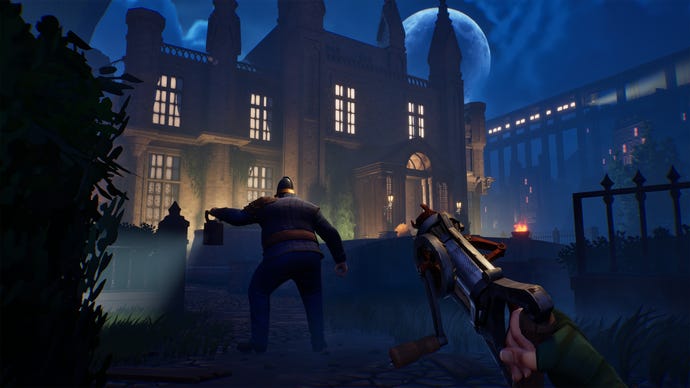
Ah, yes: Mr Spector. The world’s most famous advocate for the immersive sim genre, and director of core RPS text Deus Ex. After the closure of Epic Mickey studio Junction Point and a spell in academia, Spector joined OtherSide to lead the production of the ill-fated System Shock 3. There he remains, overseeing not just Thick as Thieves but Argos: Riders of the Storm, another multiplayer immersive sim. He’s now entering his fourth decade in game development.
It’s rare to be able to speak to Spector face-to-face, albeit over Zoom – he’s a literary man, and usually prefers to answer questions in writing. In person, he has a folksy quality, and by his own admittance talks a little more than he means to. His first love – Dungeons & Dragons, which he played as a young man with cyberpunk pioneer Bruce Sterling as his DM – regularly comes up without prompting.
“One of the hallmarks of the immersive sim genre is trying to recreate the feeling of playing Dungeons & Dragons,” he says. “And solo play is great, but telling stories with your friends is even better. So we wanted to see what would happen if a group of players got together and interacted with a deeply simulated world.”
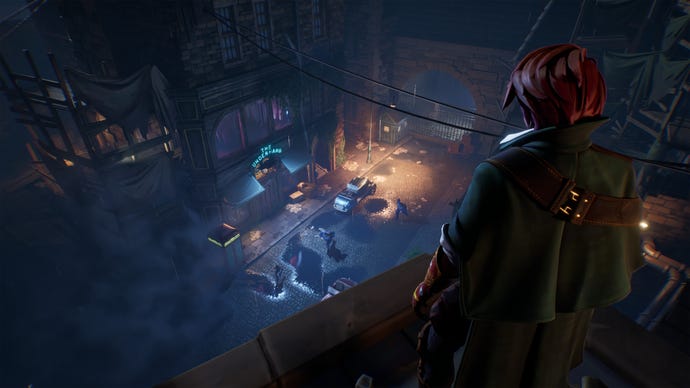
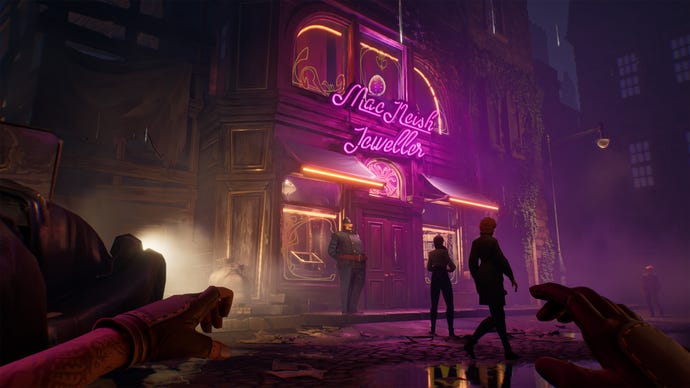
This is also Spector’s way into the world of live service. “Tabletop role-playing games have an ongoing life. They don’t just end when you finish a quest. And so we wanted to emulate that approach and make a game that had an ongoing life,” he says. “I played in one D&D campaign for 10 years. I want players to feel like that about Thick as Thieves.”
You might also recognise the influence of the extraction shooter in Thick as Thieves’ DNA. Over the past half a decade, games like Hunt: Showdown have popularised a form of session-based infiltration in which you acquire a package and get out – with the tension provided by other players, who might pounce and wrest the prize from your possession at any time.
Thick as Thieves is structured much the same way. As an agent of the thieves’ guild, you go out every night with the goal of lifting rare treasure from under the noses of NPC guards, while taking care to circumvent or subvert the traps, locks and other security measures in your way. Meanwhile, other players are trying to achieve the same.
Perhaps you’ll stage an ambush and knock a fellow player out cold, stealing their belongings in the process; maybe you’ll avoid their notice and reach an exit without any kind of confrontation at all. Ideally, you’ll get out with the goods the guild was after, or at least enough ill-gotten gold to improve your character’s net worth and reputation in the metagame. In between missions, each player will choose quests and follow the thread of a personal storyline.
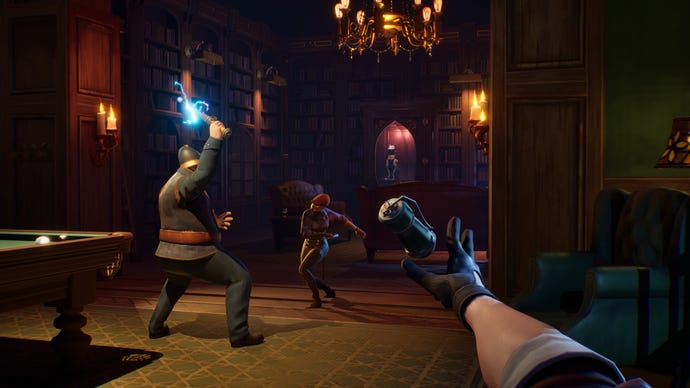
“We imagine a game where one player could kick in the door, knock everybody out, smash the display case, then jump out the window,” McDonough says. “And another player will hide in the rafters like a ghost, and nobody even knows they’re there. And those two playstyles are equally valid, and will compete with each other.”
This isn’t the first attempt at a stealth-focused extraction game. Notably, Hood: Outlaws & Legends channelled Assassin’s Creed in Sherwood Forest, while the underrated Deceive Inc brought Hitman-style social stealth into the equation. Where OtherSide’s offering stands out – to me, at least – is in its commitment to “classic immersive sim design”.
“The guards, the security, the rules of the environment, the way the characters traverse and the way that their tools work – they’re all systemic, which means that everything you do touches everything else, and the world responds to you in natural ways,” McDonough says.
With each session, the placement of enemies, cameras and locked doors will change, along with the objectives. The only way to guarantee your survival is to improvise. “We feel like this is our strongest conceptual link to how it felt to play classic Thief,” McDonough says. “I don’t know how the mission is going to play out, but I know how my tools work, and I know what to do with them, so I’m going to find my own way through this.”
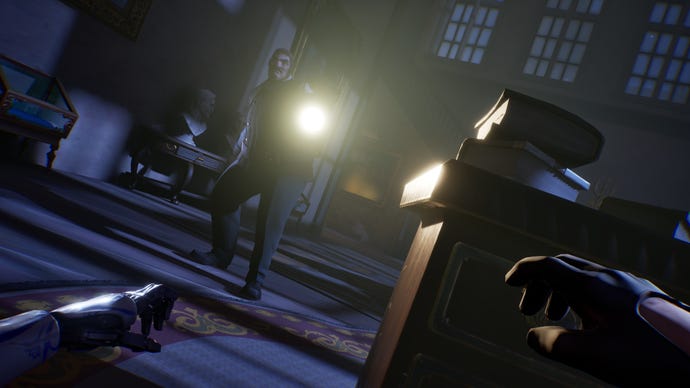
In a way, it’s odd that immersive sims didn’t embrace multiplayer sooner. If the genre is built to bounce variables off each other in unexpected ways, then rival players are a gift – the most mercurial element you could possibly add to the mix. “One of the things that makes Thief games work is that knife’s edge – am I caught, am I not?” Spector says. “The introduction of other live humans makes that even more exciting.”
“The intention of the other player is a mystery to you,” LoPiccolo points out. “It’s not like Team Fortress where you’ve got a very simple agenda. In this case, your agenda is complex, theirs is complex, and you can’t predict how they’re going to respond.” As we’re talking, I imagine using the Thick of Thieves equivalent of a noisemaker arrow to send guards in the direction of a human opponent, leaving them tangled in a high-pressure stealth scenario. Spector claps his hands together with glee: “This is totally convincing me that the game is totally going to work.”
There are reasons to be wary. OtherSide’s only released game to date, Underworld Ascendant, was another spiritual successor to a beloved immersive sim – but ended in buggy disaster, disappointing its Kickstarter backers. “We were focused on building a damn studio,” Spector admits, “and probably didn’t pay enough attention.” This time around, OtherSide has the help of publisher Megabit, who can shoulder much of the business side while the developers focus on making games.
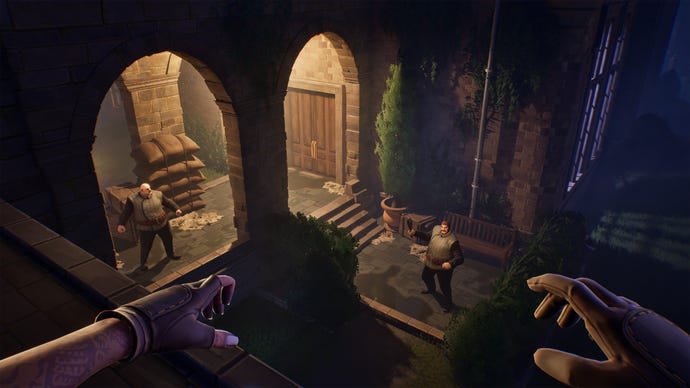
“It’s a completely different team [working on Thick as Thieves],” Spector says. “A larger team more capable of tackling the incredible challenges of making immersive sims. No one believes me until they work on these games – what we do here is harder than what most people do in game development. And we have people who are talented enough, and enough of them, to pull it off.”
Spector has said that he’s likely the oldest person still involved in active game development. Which begs the question: given the inherent difficulty of making immersive sims, and after the pain of losing System Shock 3, what keeps him coming back to the trenches?
“I am as interested in making people as I am in making games,” he says. “I probably shouldn’t have said that out loud, but there you go. I have no filters. I’m interested in passing the torch so this kind of game continues.”
Seeing the rise of Arkane and the immersive sim elements that have crept into Zelda and Baldur’s Gate 3 has been gratifying for Spector. But he left academia halfway through a three year stint at the University of Texas because he felt there was still work to be done. “We’re in this young art form, and even after 40 or 50 years, anybody who thinks we’re done isn’t paying attention,” he says. “The opportunity to create a new art form or contribute to its growth comes along once or twice a century. How can you not want to be a part of that? I try to surround myself with people who feel that way, who want to advance the state of the art.
“My personal mission is ‘playstyle matters,’” he goes on. “And those are not just words. I’m going to do that until people won’t let me anymore. But when I say I’m going to do it, I’m going to find people who can do it better than me, and will continue it. So 20 years from now, if I’m still around, I get to see what they’ve done to take this to places I never even imagined.”
